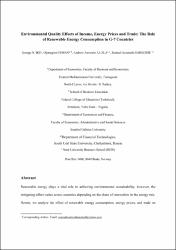| dc.contributor.author | Ike, George N. | |
| dc.contributor.author | Usman, Ojonugwa | |
| dc.contributor.author | Alola, Andrew Adewale | |
| dc.contributor.author | Sarkodie, Samuel Asumadu | |
| dc.date.accessioned | 2020-06-07T13:14:43Z | |
| dc.date.available | 2020-06-07T13:14:43Z | |
| dc.date.issued | 2020 | en_US |
| dc.identifier.issn | 0048-9697 | |
| dc.identifier.issn | 1879-1026 | |
| dc.identifier.uri | https://hdl.handle.net/11363/2190 | |
| dc.description | Document Information
Language:English
Accession Number: WOS:000535467800021
PubMed ID: 32197283 | en_US |
| dc.description.abstract | Renewable energy plays a vital role in achieving environmental sustainability, however, the mitigating effect varies across countries depending on the share of renewables in the energy mix. Herein, we analyze the effect of renewable energy consumption, energy prices, and trade on emissions in G-7 countries. The results demonstrate that renewable energy and energy prices exert negative pressure on CO2 emissions while trade volume exerts a robust positive pressure on CO2 emissions. The country-specific estimation results provide evidence of a negative effect of energy prices on CO2 emissions. While the environmental Kuznets curve hypothesis is validated at the panel and country-specific levels, the effect of renewable energy consumption and trade, are disparate across countries. The panel Granger causality shows a mono-directional causality flowing from energy prices, GDP, the quadratic term of GDP and trade to CO2 emissions. Renewable energy consumption, however, has no causal relationship with CO2 emissions but indirectly affects CO2 emissions through its direct effect on energy prices. Joint action on trade, energy prices, and country-specific renewable energy policies have implications for environmental sustainability and the attainment of the Sustainable Development Goals (SDGs). | en_US |
| dc.description.sponsorship | SAS acknowledges Nord University Business School for their financial support. | en_US |
| dc.language.iso | eng | en_US |
| dc.publisher | ELSEVIER, RADARWEG 29, 1043 NX AMSTERDAM, NETHERLANDS | en_US |
| dc.relation.isversionof | 10.1016/j.scitotenv.2020.137813 | en_US |
| dc.rights | info:eu-repo/semantics/openAccess | en_US |
| dc.rights | Attribution-NonCommercial-NoDerivs 3.0 United States | * |
| dc.rights.uri | http://creativecommons.org/licenses/by-nc-nd/3.0/us/ | * |
| dc.subject | Renewable energy consumption | en_US |
| dc.subject | Energy prices | en_US |
| dc.subject | EKC hypothesis | en_US |
| dc.subject | G7 countries | en_US |
| dc.subject | KUZNETS CURVE HYPOTHESIS | en_US |
| dc.subject | CO2 EMISSIONS | en_US |
| dc.subject | ECONOMIC-GROWTH | en_US |
| dc.subject | FINANCIAL DEVELOPMENT | en_US |
| dc.subject | EMPIRICAL-EVIDENCE | en_US |
| dc.subject | OIL PRICES | en_US |
| dc.subject | CONVERGENCE | en_US |
| dc.subject | NEXUS | en_US |
| dc.subject | G7 | en_US |
| dc.subject | URBANIZATION | en_US |
| dc.title | Environmental quality effects of income, energy prices and trade: The role of renewable energy consumption in G-7 countries | en_US |
| dc.type | article | en_US |
| dc.relation.ispartof | SCIENCE OF THE TOTAL ENVIRONMENT | en_US |
| dc.department | İktisadi İdari ve Sosyal Bilimler Fakültesi | en_US |
| dc.authorid | https://orcid.org/0000-0001-5035-5983 | en_US |
| dc.identifier.volume | 721 | en_US |
| dc.relation.publicationcategory | Makale - Uluslararası Hakemli Dergi - Kurum Öğretim Elemanı | en_US |



















